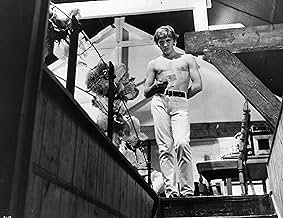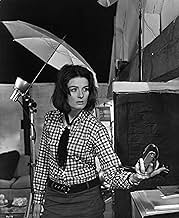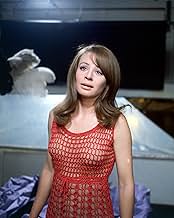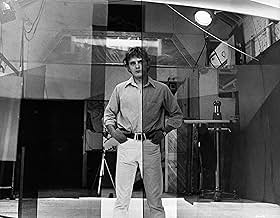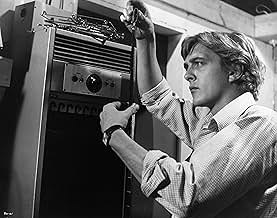Nella Londra dell'era Mod, un fotografo nota un'immagine sospetta nelle foto che ha scattato di una donna misteriosa in un parco desolato.Nella Londra dell'era Mod, un fotografo nota un'immagine sospetta nelle foto che ha scattato di una donna misteriosa in un parco desolato.Nella Londra dell'era Mod, un fotografo nota un'immagine sospetta nelle foto che ha scattato di una donna misteriosa in un parco desolato.
- Regia
- Sceneggiatura
- Star
- Candidato a 2 Oscar
- 8 vittorie e 9 candidature totali
Veruschka von Lehndorff
- Verushka
- (as Verushka)
Jeff Beck
- Self - The Yardbirds
- (non citato nei titoli originali)
Roy Beck
- Boy dancing In Ricki Tick Club
- (non citato nei titoli originali)
Charlie Bird
- Homeless Man
- (non citato nei titoli originali)
Susan Brodrick
- Antique shop owner
- (non citato nei titoli originali)
Robin Burns
- Homeless Man
- (non citato nei titoli originali)
Tsai Chin
- Thomas's receptionist
- (non citato nei titoli originali)
Julio Cortázar
- Homeless Man
- (non citato nei titoli originali)
Chris Dreja
- Self - The Yardbirds
- (non citato nei titoli originali)
Recensioni in evidenza
I realize that this is a cinema classic, taught in cinema courses everywhere. And I recognize that there is some pretty remarkable stuff here. But some of it I found very off-putting.
First, to the good: the cinematography is almost constantly remarkable. The way scenes are framed, the constant variation of camera angles, the switches between close and far, etc. I almost would have preferred this without sound. There was so much of interest to watch.
There was little of interest to hear, however. The dialogue is inane. And the protagonist is an egotistical, selfish, thoroughly repugnant excuse for a man. Maybe he's alienated from his world. Why would I care? He does everything to demonstrate that he cares about nothing and no one but himself.
Just past the midpoint of this movie, it starts to become interesting when the photographer detects something in the background of one of his photos. When it turns out a man was murdered, he wants to know more. But why? He's never shown any interest in anything other than himself up until then?
And, finally, he seems to forget about it all.
Watch this once for the amazing camerawork. But as for the plot, the characters, and the rest, don't expect to be engaged. I certainly wasn't.
First, to the good: the cinematography is almost constantly remarkable. The way scenes are framed, the constant variation of camera angles, the switches between close and far, etc. I almost would have preferred this without sound. There was so much of interest to watch.
There was little of interest to hear, however. The dialogue is inane. And the protagonist is an egotistical, selfish, thoroughly repugnant excuse for a man. Maybe he's alienated from his world. Why would I care? He does everything to demonstrate that he cares about nothing and no one but himself.
Just past the midpoint of this movie, it starts to become interesting when the photographer detects something in the background of one of his photos. When it turns out a man was murdered, he wants to know more. But why? He's never shown any interest in anything other than himself up until then?
And, finally, he seems to forget about it all.
Watch this once for the amazing camerawork. But as for the plot, the characters, and the rest, don't expect to be engaged. I certainly wasn't.
If you believe that the ending makes the movie, Blowup is for you. The first 30 minutes seem aimless and wandering, but they set up the main character and what is he is to discover about himself, about his occupation and about art in general. Antonioni builds tension (or frustration as you're watching it) not with plot, but with anti-plot. You want to scream at David Hemmings's character to: focus! screw those models! do something! But as the film unfolds you will see why Antonioni chose this actor, this profession and those girls. A wonderful manifesto about the dangers of voyeurism and what it does to a man's sexuality that is 40 years ahead of its time. The symbolism might get heavy handed at times (mimes, a broken guitar), but the sets are so full of creativity and the actors so beautiful (this will give my age away, but Vanessa Redgrave, who knew?) that you forgive Antonioni (he's Italian after all). Hemmings is Hugh Grant before Hugh Grant, but in this role at least, much more interesting. He's highly sexual, but unlike his painter roommate, his chosen art form represses him, all in the name of the shot. And when he finally gets the perfect shot in the perfect light, it's so perfect that someone steals it, and for good reason. Did those events actually take place or just through his camera lens? When the photos are the proof of what you see, then when that proof is taken away, did you see?
I would recommend that people who are considering watching this film for the first time not read the following. I don't mention the film's ending, I just believe its far more satisfying to let the films potent details nervously sink into place on their own.
It is not about cameras. It is not about seeing. It is about our perception of our individual world. It throws shadows on the very judgments we build our lives upon. Without mentioning the obvious references to illusion (the mimes, the abstract picture of the corpse, etc.), I offer the following expert signposts Antonioni leaves for us to find.
1) The guitar neck David snatches at the rave-up has value only until he is not being chased for it, whereupon he discards it in the street. The pedestrian who then picks it up sees it only as junk.
2) Dialogue with his model friend at the pot party: DAVID - ` I thought you were in Paris.' THE GIRL - `I am'.
3) Appearances and Disappearance (2 of the many). The Lynn Redgrave character pops up as he arrives at his apartment. His question `How did you find me' is not explained. Later in the story, it is notably odd when David wakes up the following morning after the pot party that there is no one to be seen in the party house. Even the decorations like the clothes hung on the statue the night before have vanished.
4) David teaches the affectations of smoking to the woman. She must create an impression.
5) His painter friend describes his painting. `They don't mean anything to me while I work on them. Its only later that I ascribed something to them. Like this leg.' Whereupon he points out a place in a painting that might be a human leg. When he paints, he is tapping subconscious language, something apart from subjective and objective reality. Its as if Antonioni is offering us an even further vantage point to the events to come, dream reality.
6) The rambling diversion of events shows David's inability to `focus' on working through his mystery.
7) So much is hidden from the viewer. Its almost suggested that the real end to the narrative takes place someplace after the movie has already finished, jarring our sense of story, insinuating an ending we never get to `see'.
8) David announces at one point to his friend, `If only I had more money I'd be all right.'. Meanwhile he drives through the whole movie in his Rolls Royce.
This is a very remarkable film. I was irked by the pacing and the diversions as I watched it, but that was exactly why it all kept coming and coming at me for hours after until finally in bed it all rushed through me like a gorgeous musical event. I know for certain there are many more hidden corners to it, but this is what I got in my first viewing. Just that gut feeling that I missed something, I believe, is exactly where Antonioni was going. You always miss something.
It is not about cameras. It is not about seeing. It is about our perception of our individual world. It throws shadows on the very judgments we build our lives upon. Without mentioning the obvious references to illusion (the mimes, the abstract picture of the corpse, etc.), I offer the following expert signposts Antonioni leaves for us to find.
1) The guitar neck David snatches at the rave-up has value only until he is not being chased for it, whereupon he discards it in the street. The pedestrian who then picks it up sees it only as junk.
2) Dialogue with his model friend at the pot party: DAVID - ` I thought you were in Paris.' THE GIRL - `I am'.
3) Appearances and Disappearance (2 of the many). The Lynn Redgrave character pops up as he arrives at his apartment. His question `How did you find me' is not explained. Later in the story, it is notably odd when David wakes up the following morning after the pot party that there is no one to be seen in the party house. Even the decorations like the clothes hung on the statue the night before have vanished.
4) David teaches the affectations of smoking to the woman. She must create an impression.
5) His painter friend describes his painting. `They don't mean anything to me while I work on them. Its only later that I ascribed something to them. Like this leg.' Whereupon he points out a place in a painting that might be a human leg. When he paints, he is tapping subconscious language, something apart from subjective and objective reality. Its as if Antonioni is offering us an even further vantage point to the events to come, dream reality.
6) The rambling diversion of events shows David's inability to `focus' on working through his mystery.
7) So much is hidden from the viewer. Its almost suggested that the real end to the narrative takes place someplace after the movie has already finished, jarring our sense of story, insinuating an ending we never get to `see'.
8) David announces at one point to his friend, `If only I had more money I'd be all right.'. Meanwhile he drives through the whole movie in his Rolls Royce.
This is a very remarkable film. I was irked by the pacing and the diversions as I watched it, but that was exactly why it all kept coming and coming at me for hours after until finally in bed it all rushed through me like a gorgeous musical event. I know for certain there are many more hidden corners to it, but this is what I got in my first viewing. Just that gut feeling that I missed something, I believe, is exactly where Antonioni was going. You always miss something.
Some interpret this existential film to mean that human reality is defined in the context of the group, not the individual. Hence, in the film, to Thomas (David Hemmings), the murder did occur. But, the murder's "reality" is objective only if Thomas can verify it through someone else's experience. Otherwise, Thomas' observed event is subjective and problematic. Each individual thus sees through a glass darkly ... even when the glass is an "objective" camera lens. Ironically, the same could be said for Antonioni.
This film came out only three years after the JFK assassination. I find it hard to believe that that event did not play into this film to some extent. There are all kinds of references to the assassination: the grassy area and picket fence; photographic evidence of a "badge man" character with gun hiding in the bushes; the subsequently developed pictures having been presumably stolen or altered as part of some conspiracy. It's almost as if Thomas and his camera represent the Zapruder film component of the assassination. Indeed, the causal "reality" of the JFK murder was, and still is, to some extent a function of human perception, derived from an interpretation of what the camera sees.
"Blowup" is unlike most films. There are long takes, with minimal editing. This gives the film a slow, meandering feel. Dialogue is minimal. Natural sounds override music, throughout. And like other Antonioni films, this one is mostly visual. The cinematography is striking.
Another characteristic is that the film is not plot intensive. Nor are the characters sympathetic. Thomas is not at all likable. And other characters are mere mannequins. I question whether Antonioni needed two hours to convey his message. More of a plot might have reduced the need for so much seemingly irrelevant filler.
"Blowup" is mostly for viewers who like unconventional, arty films that impart abstruse philosophical "meaning". The film is therefore aimed at people who like to think and ponder.
This film came out only three years after the JFK assassination. I find it hard to believe that that event did not play into this film to some extent. There are all kinds of references to the assassination: the grassy area and picket fence; photographic evidence of a "badge man" character with gun hiding in the bushes; the subsequently developed pictures having been presumably stolen or altered as part of some conspiracy. It's almost as if Thomas and his camera represent the Zapruder film component of the assassination. Indeed, the causal "reality" of the JFK murder was, and still is, to some extent a function of human perception, derived from an interpretation of what the camera sees.
"Blowup" is unlike most films. There are long takes, with minimal editing. This gives the film a slow, meandering feel. Dialogue is minimal. Natural sounds override music, throughout. And like other Antonioni films, this one is mostly visual. The cinematography is striking.
Another characteristic is that the film is not plot intensive. Nor are the characters sympathetic. Thomas is not at all likable. And other characters are mere mannequins. I question whether Antonioni needed two hours to convey his message. More of a plot might have reduced the need for so much seemingly irrelevant filler.
"Blowup" is mostly for viewers who like unconventional, arty films that impart abstruse philosophical "meaning". The film is therefore aimed at people who like to think and ponder.
Blow Up is the quintessential 60' s movie with a roster of talented British actors, colourful mod fashions (now back in vogue), dreary post-war London locations and empty streets, groovy music by American composer extraordinaire Herbie Hancock and an Italian director and writer in love with the whole scene. Blow Up is the cinematic equivalent of the TR4 cabriolet, designed by Michelotti and manufactured by Triumph during the same period, and mixes the best of two rather different cultures. The movie offers the right amount of nudity, sensuality and perversion without offending the prude status quo of swinging Olde England. David Hemmings plays a character who is by all accounts snobbish, homophobic, prejudiced, rude and macho. This pseudo thriller/whodunit unwinds rather slowly and with little dialogue and, I think, is just an excuse for Antonioni to show how weird the English were. A must see flick for the ones nostalgic or who missed the 60' s completely.
Lo sapevi?
- QuizThe film contains a rare performance of The Yardbirds during the period when Jimmy Page and Jeff Beck were both in the band. Jeff Beck would leave a few months later.
- BlooperWhen Thomas is frolicking with the two girls on the purple paper backdrop in the studio, two crew members, including a camera operator, can be seen just sitting there in the top right side of the frame.
- Versioni alternativeSome of the music was rescored for the Warner DVD release, namely the latter part of the opening title music. The VHS releases' music remain intact.
- ConnessioniFeatured in Film Review: How I Learned to Live with Being a Star (1967)
- Colonne sonoreMain Title (Blow-Up)
Written and Performed by Herbie Hancock
I più visti
Accedi per valutare e creare un elenco di titoli salvati per ottenere consigli personalizzati
- How long is Blow-Up?Powered by Alexa
Dettagli
- Data di uscita
- Paesi di origine
- Sito ufficiale
- Lingua
- Celebre anche come
- Deseo de una mañana de verano
- Luoghi delle riprese
- Maryon Park, Woolwich Road, Charlton, Londra, Inghilterra, Regno Unito(scenes where Thomas first photographs Jane and where mime artists play tennis at the end)
- Aziende produttrici
- Vedi altri crediti dell’azienda su IMDbPro
Botteghino
- Budget
- 1.800.000 USD (previsto)
- Lordo in tutto il mondo
- 38.575 USD
- Tempo di esecuzione
- 1h 51min(111 min)
- Mix di suoni
- Proporzioni
- 1.85 : 1
Contribuisci a questa pagina
Suggerisci una modifica o aggiungi i contenuti mancanti



